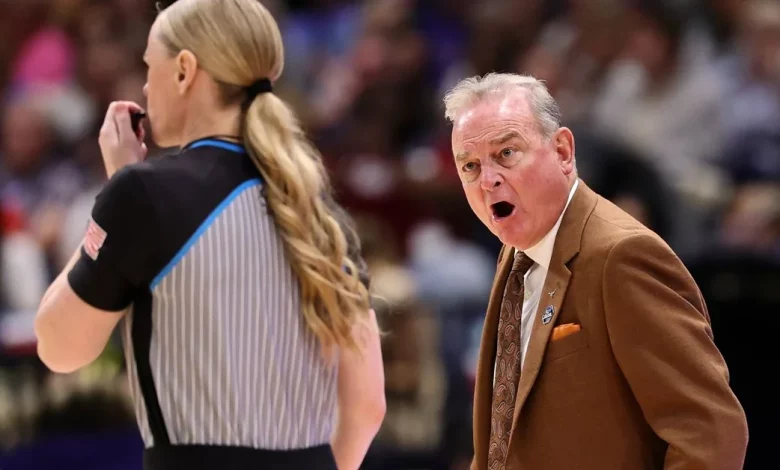Texas coach Vic Schaefer calls out officiating after women’s Final Four loss to South Carolina, citing questionable calls.

In the world of high-stakes sports, emotions run high, and decisions can make or break a game. This was especially true during the 2025 NCAA Women’s Basketball Final Four, where Texas, under head coach Vic Schaefer, faced South Carolina in a tense, high-intensity matchup. While the game itself was filled with remarkable plays, critical moments, and superb athleticism, the aftermath of the game saw something equally significant: an outspoken criticism of the officiating by Schaefer.
The Texas Longhorns had fought valiantly, showcasing their skills, tenacity, and championship aspirations. But as the final buzzer sounded, signaling their loss to South Carolina, Schaefer’s frustration wasn’t solely focused on his team’s performance. Instead, the veteran coach directed his attention toward the officiating, questioning the fairness and consistency of certain calls made during the game. His words reverberated throughout the sports world, with many fans and analysts weighing in on whether his critique was valid or a coach’s emotional reaction to a tough defeat.
This article explores the context of the game, Schaefer’s comments on the officiating, and the broader implications of officiating in high-profile games like the NCAA Women’s Basketball Final Four.
The Game: Texas vs. South Carolina
Before delving into Schaefer’s post-game comments, it’s important to understand the context of the game itself. Texas entered the Final Four as one of the premier teams in women’s college basketball, a powerhouse with an explosive offense and a lockdown defense. Under Schaefer’s leadership, the Longhorns had been one of the most competitive teams in the country, riding high on the shoulders of star players and a well-coached system. But their path to the championship was never going to be easy, and standing in their way was a formidable opponent: the South Carolina Gamecocks.
Led by head coach Dawn Staley, South Carolina was coming off a dominant season and had established itself as a perennial powerhouse in women’s basketball. With a blend of experienced players and emerging talent, they were a tough opponent for any team. The matchup promised to be a spectacle of elite basketball, showcasing two of the best teams in the country.
The game lived up to expectations in many ways, with both teams exchanging blows and pushing each other to the limit. The physicality of the contest was evident, with intense defense and high-pressure moments. Both teams were playing for a chance to advance to the national championship, so every possession mattered. In the end, South Carolina prevailed, securing their victory in a hard-fought, closely contested game.
The Controversial Calls: Schaefer’s Critique
Despite the fierce competition, what dominated the conversation following the game was Schaefer’s critique of the officiating. Following the loss, the Texas coach expressed frustration over what he considered questionable calls that had a significant impact on the flow and outcome of the game.
Schaefer’s remarks focused on several critical instances in which he believed his team had been unfairly penalized. One of the most contentious moments came late in the game when a key Texas player, who had been dominating on both ends of the floor, was called for a controversial foul. Schaefer believed that the foul was a poor decision, as he felt the contact was incidental, but it sent his player to the bench at a crucial juncture. This decision, in Schaefer’s eyes, shifted the momentum of the game, depriving Texas of one of their most influential players during an essential stretch.
Another moment of contention came when South Carolina was awarded a set of free throws under disputed circumstances. Schaefer argued that the calls were inconsistent with how the game had been officiated up to that point, and the free throws contributed to a shift in the game’s rhythm. In high-stakes games like the Final Four, where every call has the potential to change the outcome, these moments are especially amplified.
Schaefer was also vocal about what he perceived as a lack of consistency in the referees’ approach to physical play. Texas had a reputation for playing tough defense, and Schaefer argued that his players were being unfairly penalized for their aggressive style while South Carolina was allowed a similar level of physicality without facing the same scrutiny. This perceived inconsistency in the officiating was a major source of frustration for Schaefer, who believed that Texas’ efforts to match South Carolina’s intensity were being undermined by the referees’ decisions.
The Emotional Impact of Loss and Officiating
While Schaefer’s critique was rooted in what he saw as a lack of fairness on the court, it’s important to recognize that coaches often express heightened emotions in the aftermath of tough losses. For Schaefer, as for many coaches, every loss carries a deep personal weight, especially in high-profile games such as the Final Four. The heartbreak of falling short in such a crucial moment can lead to an emotional response, and Schaefer’s post-game remarks were a reflection of that emotion.
The loss to South Carolina was not just a loss in terms of advancing to the national championship; it represented an opportunity missed, a moment when everything had come together for Texas, only for the game to slip away. For a coach like Schaefer, who has dedicated his career to building a competitive and successful program, these kinds of losses sting deeply.
However, it is also important to understand that criticism of officiating is a part of the game. Coaches, players, and fans alike are all subject to the scrutiny of referees, and the occasional controversial call is an unfortunate reality in every sport. Officiating in basketball, especially at the highest levels, is a difficult job. Officials are tasked with making split-second decisions in high-pressure situations, and while mistakes happen, they are part of the fabric of sports.
That being said, Schaefer’s comments were not entirely without merit. There have been numerous instances throughout the history of college basketball where officiating has been called into question, especially during critical moments in big games. Coaches, including Schaefer, are not only representing their teams but also advocating for fairness and consistency on behalf of their players.
The Role of Officiating in High-Stakes Games
Officiating in college basketball is under more scrutiny than ever before, especially during high-stakes matchups like the Final Four. These games are watched by millions of people, and the decisions made by referees can influence not just the outcome of a game but also the perception of fairness and integrity within the sport. As such, it is no surprise that coaches like Schaefer feel a responsibility to speak out when they believe the officiating has affected the game in an unjust way.
However, the role of officiating goes beyond simply making the correct calls. It also involves managing the flow of the game, ensuring that players are able to play with intensity while maintaining control of the contest. In high-pressure games, the referees must strike a delicate balance between allowing physical play and calling fouls when necessary. This is a task that requires a great deal of skill, and it is often a point of contention for coaches and fans alike.
Schaefer’s comments highlight a broader issue in college basketball: the inconsistency of officiating. While the officials aim to be as fair and unbiased as possible, the perception of inconsistency can lead to frustration, especially for coaches whose livelihoods depend on the outcome of these games. In Schaefer’s case, he believed that the calls made in the game were not consistent with the level of physical play exhibited by both teams. This perceived lack of fairness is what led to his passionate response after the game.
The Aftermath: Schaefer’s Comments and the Public Reaction
Following Schaefer’s remarks, the public reaction was mixed. Some supporters of the Texas program rallied behind the coach, agreeing that the officiating played a significant role in the outcome of the game. They pointed to the controversial calls as key moments that shifted the balance of the contest, arguing that Schaefer had every right to express his displeasure.
Others, however, felt that Schaefer’s comments were a reflection of a coach struggling to accept defeat. While they acknowledged that officiating can sometimes be questionable, they argued that the Texas coach’s focus should have been on his team’s performance rather than external factors. These critics felt that Schaefer’s remarks undermined the accomplishments of South Carolina, who had played an outstanding game and earned their victory on the court.
Ultimately, the debate over Schaefer’s comments underscored the larger conversation about officiating in college basketball. While officiating errors are an inevitable part of any sport, the question remains: How can the sport ensure fairness and consistency, particularly in games that carry the weight of a national championship?
Moving Forward: Lessons Learned
As Schaefer and the Texas Longhorns move forward, it’s clear that the lessons from the Final Four loss to South Carolina will linger. While officiating will always be a point of contention, the real focus for Schaefer and his team will be on how to learn and grow from the experience. As one of the premier coaches in women’s basketball, Schaefer understands that the key to success lies in focusing on what can be controlled—player development, team chemistry, and preparation for the next season.
For Schaefer, the criticism of officiating will likely fade with time, but the lessons learned from the game will shape the future of the Longhorns program. After all, basketball is as much about perseverance as it is about winning.









